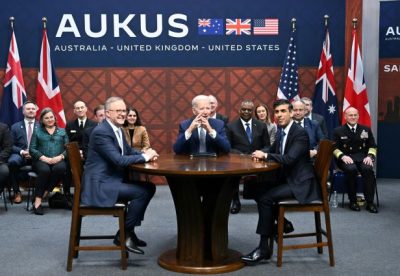AUKUS Meeting (Biden, Sunak, Albanese) Furthers “China Containment Strategy” with New Nuclear-powered Submarine Deal
Trilateral meeting between US President Joe Biden, UK PM Rishi Sunak, and Australian PM Anthony Albanese

All Global Research articles can be read in 51 languages by activating the Translate Website button below the author’s name (desktop version)
To receive Global Research’s Daily Newsletter (selected articles), click here.
Follow us on Instagram and Twitter and subscribe to our Telegram Channel. Feel free to repost and share widely Global Research articles.
***
Beijing accused the AUKUS alliance (US, UK, and Australia) of embarking on a “path of error and danger” when responding to the announcement that Australia will be supplied with nuclear-powered submarines. The multibillion-dollar deal, seen as a step to counter China’s rise in the Indo-Pacific region, was announced during a trilateral meeting between US President Joe Biden, UK Prime Minister Rishi Sunak, and Australian Prime Minister Anthony Albanese in San Diego on March 13.
Although Albanese did not mention China explicitly in his announcement of the AUKUS program, Australian Vice Admiral Jonathan Mead did directly mention China’s actions when speaking about the submarine deal.
“We recognise that there has been reclamation of land in the South China Sea and the military modernization of islands there,” Vice Admiral Mead said. “A whole bunch of factors have played into this.”
However, even if there was no acknowledgement of China by AUKUS leaders, it is beyond obvious that the AUKUS alliance and the nuclear-powered submarines deal is with the intent of limiting Beijing’s soft and hard power in the region.
“The latest joint statement from the US, UK and Australia demonstrates that the three countries, for the sake of their own geopolitical interests, completely disregard the concerns of the international communities and are walking further and further down the path of error and danger,” Beijing’s foreign ministry spokesperson Wang Wenbin said during a regular press briefing on March 14.
The spokesperson’s comment came after the Chinese delegation to the UN tweeted a statement which accused the three countries of fuelling an arms race. The tweet said the deal was a “textbook case of double standard.”
Biden rejected the accusation, saying the submarines would be “nuclear-powered, not nuclear-armed.” For her part, Australian Foreign Minister Penny Wong said the Chinese criticism was “not grounded in fact.”
Despite Beijing’s retaliatory response, the US president said he was expecting to speak with his Chinese counterpart Xi Jinping soon but declined to elaborate. Perhaps he did not do it because the Chinese foreign ministry spokesperson said his country did not want to “communicate for the sake of communicating” and that “the US side should come forward sincerely, with practical actions to promote China-US relations.”
Unsurprisingly, the foreign ministry of Taiwan, which Beijing considers a rebel province, said it “welcomes the continued advancement of the AUKUS partnership,” adding that Taiwan is “at the forefront of the fight against authoritarian expansion.” Although no announcements have been made, it is also likely that South Korea and Japan will welcome the latest deal as it is part of their collective effort to contain China.
Therefore, it is undeniable that Australia’s attainment of such a weapon is an example of the Anglo Alliance pursuing an anti-China policy. Washington has been conducting this policy in an aggressive manner since the Donald Trump presidency, with Biden only escalating it. The US and Britain for the better part of two centuries have dominated world affairs, and although the Soviets failed to dislodge this arrangement, today, it is China posing the greatest threat to their hegemony.
For this reason, they are empowering Australia as a junior partner in the Anglo alliance. New Zealand, another Anglo country that is even more isolated than Australia, warned Canberra that it will not tolerate Australian nuclear submarines in its territorial waters.
Both New Zealand’s ruling government and the opposition announced that Australia’s increasing nuclearization will not change their longstanding ban on nuclear-propelled vessels from entering New Zealand’s waters. The New Zealand government also reminded Australia of a 1980s treaty it signed to establish a nuclear weapons-free zone in the South Pacific.
According to Biden, the submarines “will not have any nuclear weapons of any kind of them.”
This of course cannot be fully trusted as Washington has a long and distinguished history of breaking agreements, such as not expanding NATO any further towards Russia, a key promise broken that eventually led to the current conflict in Ukraine.
Australia’s partnership with the US and UK in the AUKUS format began in September 2021. Under the recently signed AUKUS agreement, the Virginia-class submarines will be ready in the 2030s, meaning that US and UK submarines will be based in Australia on a rotating basis until then.
However, it is recalled that the AUKUS deal was brokered in secret and led to the 2021 cancellation of a $106 billion contract for a French-built fleet of conventional submarines. The cancellation sparked a diplomatic row within the Western alliance and re-imposed Anglo dominance over Europe, just as the EU’s self-destructive policies against Russia demonstrate.
Beijing argues that the AUKUS deal violates the Nuclear Non-Proliferation Treaty and says that the transfer of nuclear weapons materials from a nuclear-weapon state to a non-nuclear-weapon state is a “blatant” violation of the spirit of the pact.
Now that outrage has been expressed, the question is how Beijing chooses to respond because Australia will certainly not back away from the AUKUS deal like it did with the French one. China would have once considered Australia as a mid-country that regarded its economic interests as a priority; however, the consistent actions of Canberra demonstrates that it is fully integrated into the Anglo alliance.
*
Note to readers: Please click the share buttons above. Follow us on Instagram and Twitter and subscribe to our Telegram Channel. Feel free to repost and share widely Global Research articles.
Ahmed Adel is a Cairo-based geopolitics and political economy researcher.
Featured image is from InfoBrics

